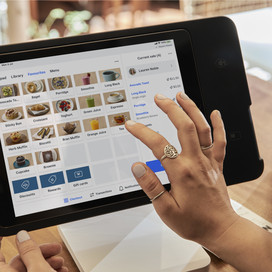Table of contents
Toasties have really taken off in Australia, but it’s much harder to source a good old Aussie jaffle. Enter Georgie “G” Smith, who started G’s Jaffles back in 2019. Starting out at markets with a little stall, G eventually got her own food truck and is now a full time jaffle queen. Things have been picking up though, and she’s thinking about getting a second food truck and having some employees. When is the right time?
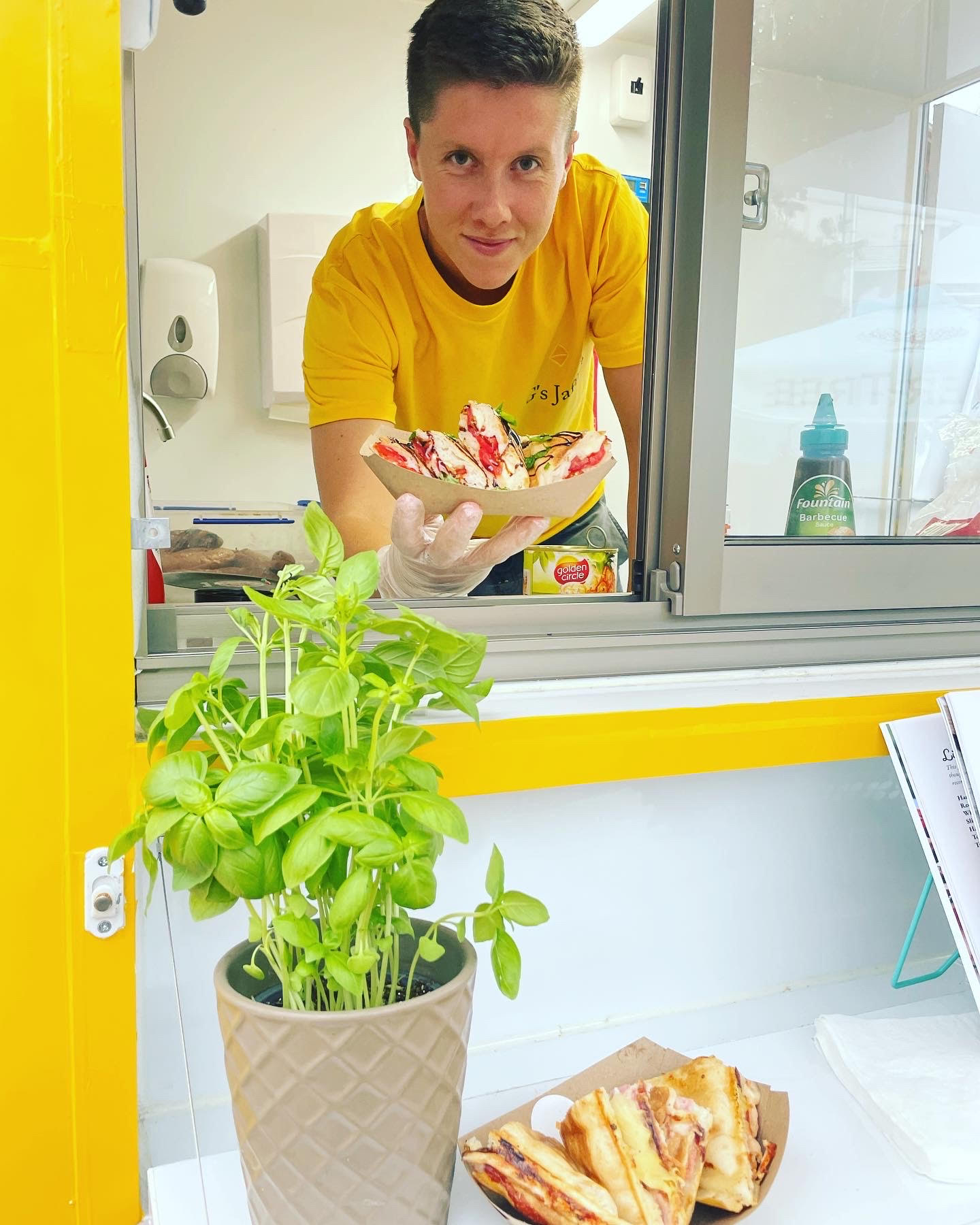
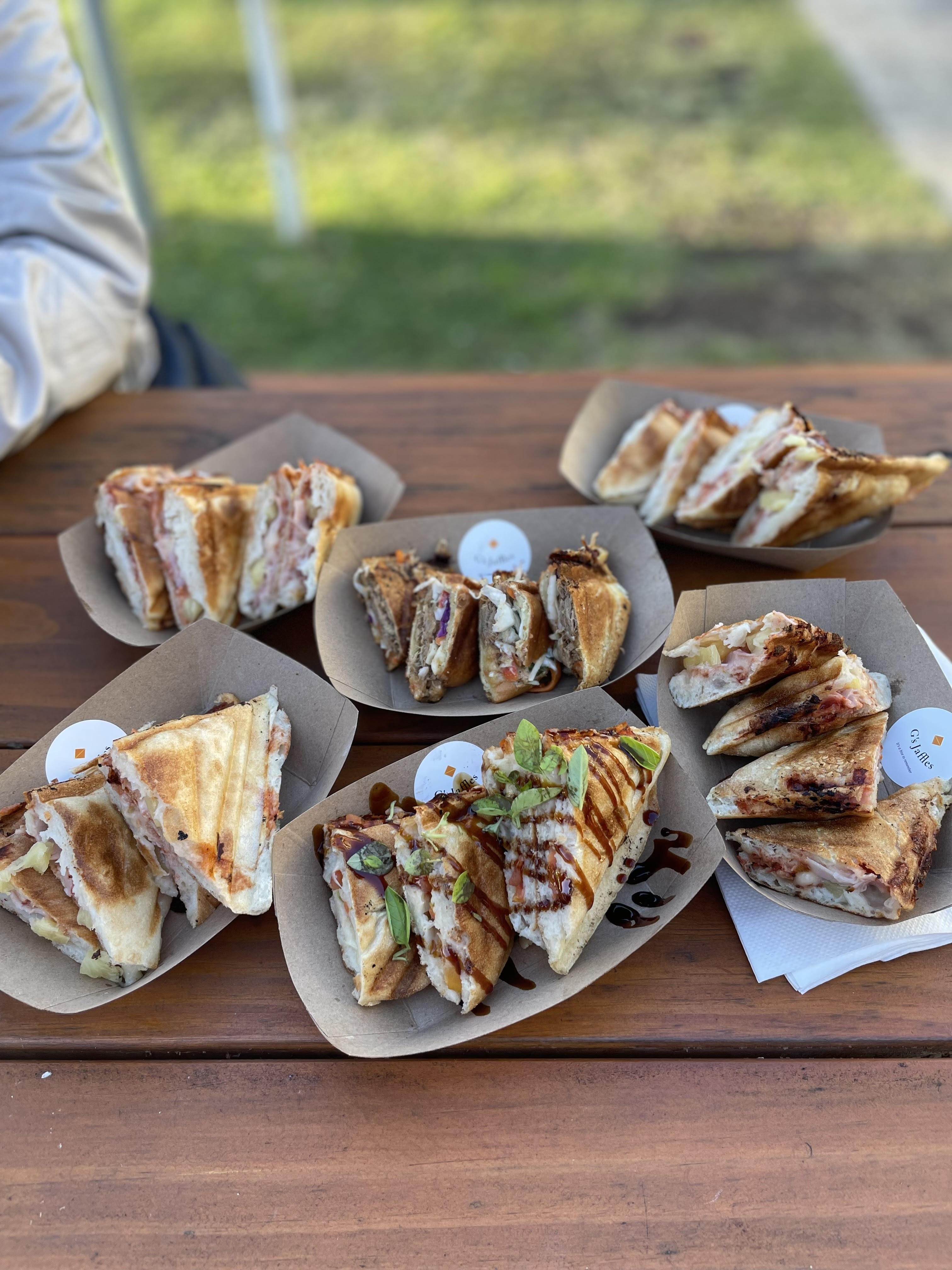
In this episode, we bring in Mo Saad from Fricken, a family recipe fried chicken shop who started out as a food truck as well, but now have a brick and mortar store, a shipping container store as well as another food truck. Together the pair chat through when to expand, their tips and tricks from running a food truck, and the benefits of a brick and mortar store.
G's Jaffles uses
Fricken uses
Subscribe to Coolroom Confessional
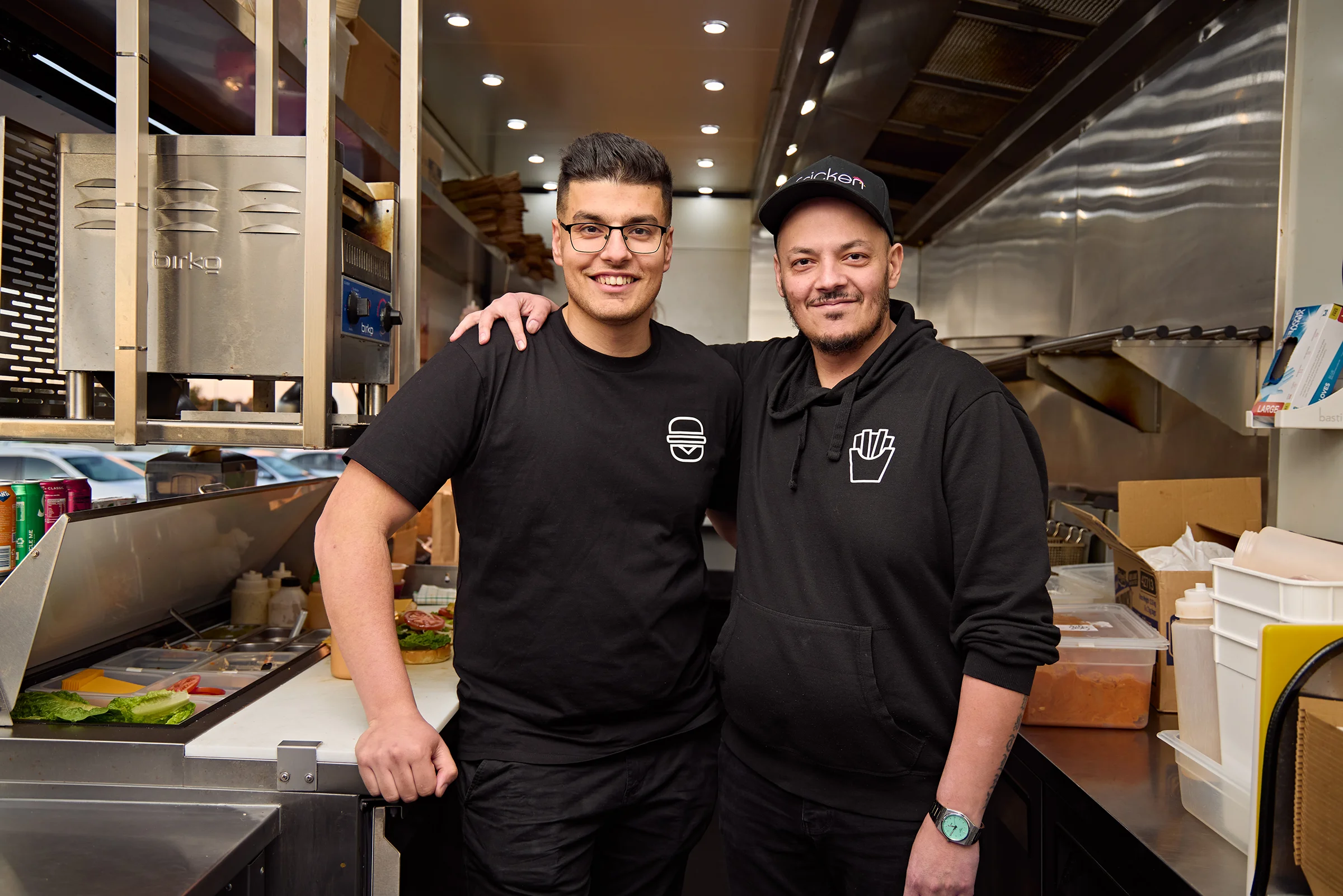
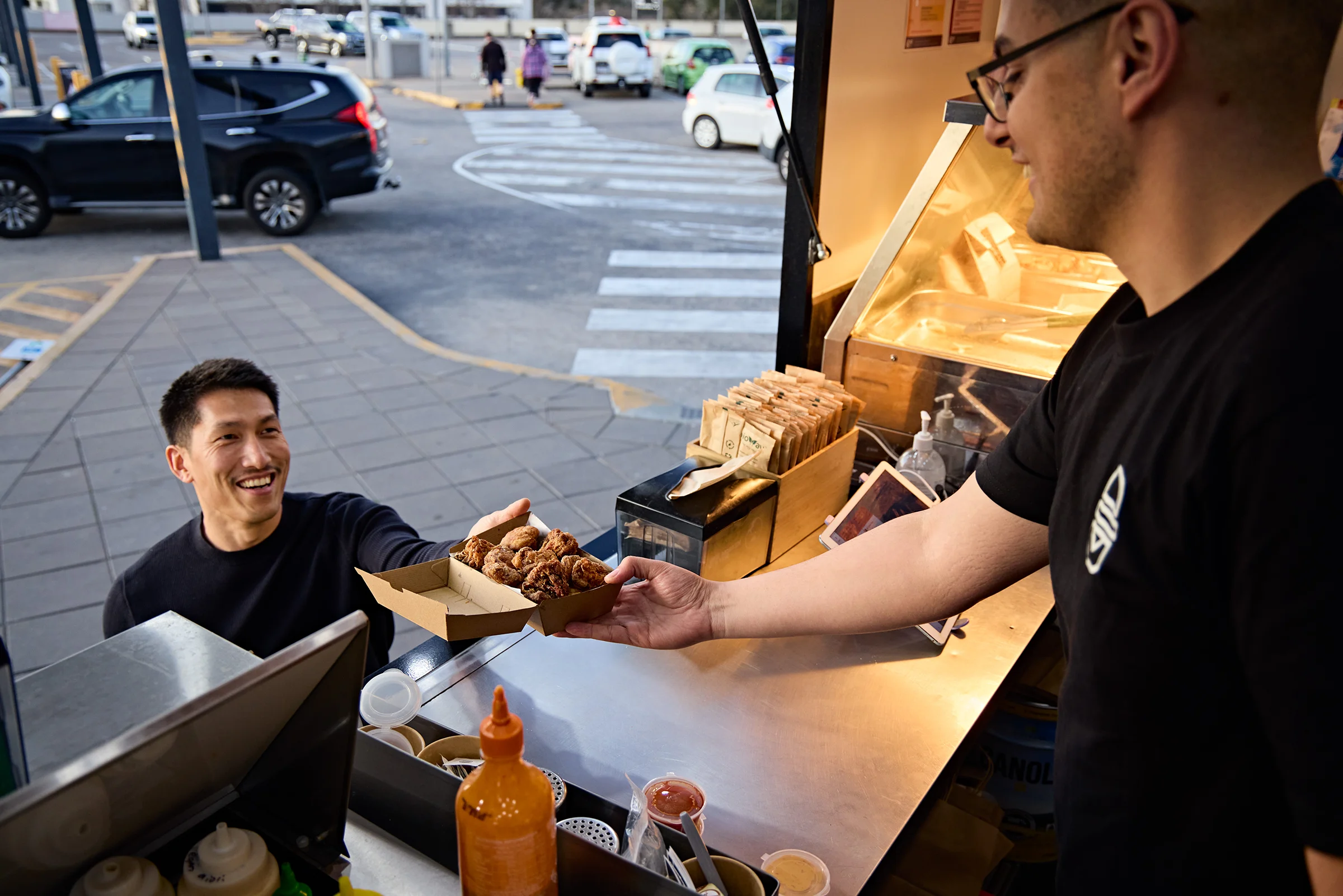
Episode Transcript
Melissa Leong:
We are proudly supported by American Express. Did you know Square sellers pay one low rate to accept all major cards including American Express? If you’re a Square seller, let your customers know that they can spend with you by ordering complimentary signage and supplies at amexpop.com/square.
Intro:
Yeah, I remember talking to the team that night, I cried. I cried in front of them.
The idea that we increase our prices, and then, obviously, all I think about is no one will come to Opus anymore.
We made so many mistakes that we’re always going to make.
Don’t let Lorenzo measure the store.
A lot of them were terrified that the business will fail within six months. They said that in those words, they were like, “You will not survive six months.”
And you have to try it. You have to just roll the dice. I think you have to take those risks.
Melissa Leong:
This is Coolroom Confessional. In this series, we’re offering hospo business owners a place to confess their problems. With some expert help, we’re going to try and solve them. I’m Melissa Leong. I’ve been a writer, culinary critic, and TV judge.
Today, we’re meeting the solo operator of G’s Jaffles, which has been named amongst Sydney’s best food trucks. Georgie Smith has moved from the markets to wheels, and she needs help in the next steps of her business journey. Let’s meet her.
Some people agonise over the name of their business, not Georgie Smith.
Georgie “G” Smith:
Everybody just says G. That’s where it came actually. It’s like Georgie’s Jaffles. No, G. It has to be G.
Melissa Leong:
And her product was a snap decision too. Inspired by her co-worker at a Sydney Childcare Center.
Georgie “G” Smith:
She whipped out that jaffle machine and started making jaffles for lunch, and I was like, “Oh my gosh, where are they? They’re not here.” You see toasties and fresh sandwiches, but you don’t see a jaffle. And from that day, when I saw her, I was like, “Jaffles. That’s it.”
Melissa Leong:
She was inspired and started selling Jaffles at markets near her family home in Sydney in 2019. At an age where studying and partying hard is typically the order of the day, G had other ideas.
Georgie “G” Smith:
The only person that could fit in the car was me. Everything was just… It was packed. My sister and my mom would come and help out. It was tough work, but it was fun. And that’s when I got to got my product out there and I loved it.
Melissa Leong:
That was five years ago. Since then, she’s hit the road and G’s Jaffles is a thriving food truck.
Georgie “G” Smith:
Whilst I was doing all the markets, I was still looking for that truck and I’ll never forget it. In 2022, in September, I stumbled across Marketplace. I don’t know. My head was like, “No, let’s just have a look.” And I fell in love with it. I could just see everything. I could see my logos, I could see the yellow. I could just see the truck.
Melissa Leong:
Since day dot, G’s had help from family. But one day, none of them could be there.
Georgie “G” Smith:
I was at a Swany’s SCG home game match. Nobody could help me out, and I was like, “Okay, Georgie, we’re going to have to do this on our own.” I mean, I was so proud of myself. I did a think about 80 jaffles on my own. Now, I’ve been doing like 80, 100, like, “Let’s do this. Go.”
Melissa Leong:
She had the courage to go truly solo, and since then, she hasn’t looked back. G quit her day job last year and runs the truck a couple of days a week, selling out at most of her gigs around Sydney. The bestseller, G’s favorite, of course.
Georgie “G” Smith:
Ham off the bone, pineapple pieces, and a pizza-based sauce, and mozzarella. So, practically a Hawaiian pizza inside a jaffle.
Melissa Leong:
G can run the truck and keep up nicely on her own, but this is one ambitious woman, and her plans could see her biting off more than she can chew.
Georgie “G” Smith:
I have to kind of let go of the business in a way. I think I need to detach myself a little bit.
Melissa Leong:
To do that, she needs to change and that involves more costs, more people, and a new business plan.
Georgie “G” Smith:
But yeah, I chose that road of wanting to work for myself and build something that I hope one day will become something big that everybody will know about.
Melissa Leong:
Georgie Smith is with us now. Do we call you G? Welcome to the show.
Georgie “G” Smith:
Absolutely, call me G.
Melissa Leong:
Now, G, you’re doing a lot on your own at the moment. What does your week look like right about now?
Georgie “G” Smith:
So, Friday, Saturday and Sunday, I smash out whatever events I have on for my food truck. And then during the week, I just do a lot of admin, a lot of preparation, just ready for the weekend to come.
Melissa Leong:
Do you have much time to work on your business as opposed to in your business?
Georgie “G” Smith:
Yes, I do have time for that. With my time, I make sure that there are certain days that I go, “Okay. This day, we’re going to do a bit of admin. This day, we need to work on what’s our menu going to be.” So, I’m very kind of strict with my times and what I do with it.
Melissa Leong:
Well, that sounds very well organised now. You seem reasonably happy with that balance for now, but you are thinking about another truck. Do you know what your next steps would be for you to do that?
Georgie “G” Smith:
My next step probably would be getting a team together. I mean, if I’m wanting to embark on that journey of getting another food truck, I definitely need to have a team on board with me, so that’s where I probably would be heading in that direction.
Also, storing the trucks. I definitely have my vision of having a big warehouse, having the commercial kitchen, and then having all my trucks just parked in there, and assigning all my different staff to whatever the truck is. So ,that’s where I’m heading to, but I’ve just got to get to the stage of getting that team together.
Melissa Leong:
That’s a very clear idea. I can see it already.
Georgie “G” Smith:
I’ve been seeing it for a really long time, and for me to just vision it, I just know that it’s going to happen.
Melissa Leong:
Now, we also have Mo Saad with us. Mo is one of four owners of Fricken Chicken, a family food truck business in Canberra that used to be where you are now, G, with one truck. Now, it has a bricks and mortar shop. And Mo, is it four trucks now?
Mo Saad:
It’s four locations, two trucks, one shipping container, and one brick and mortar store.
Melissa Leong:
Wow. Talk to me about how that process has been for you.
Mo Saad:
Fun, actually. We basically ran for two years on that first initial truck that we had, and it was just a mobile operation. From the demand that we’ve had and the feedback, we decided to start looking for long-term leases for an actual brick and mortar store.
Melissa Leong:
Yeah, right. Do you have a question for Mo surrounding the timing of making that leap from one initial truck to everything else that has happened after that?
Georgie “G” Smith:
Mo, when did you know that you were ready for taking that next leap?
Mo Saad:
The demand was the biggest factor, so it was more than what we were able to attend to, more events that we just had to pick and choose. Scheduling became a lot harder.
Georgie “G” Smith:
I really wanted to ask, how do I detach myself to enable new people who potentially will work for me and go, “I have trust in you”?
Melissa Leong:
Because you’re really at that pressure point now where I’m imagining the inbox is looking a little full. You’re trying to… I can see both of you nodding that it’s just like that’s the point in which you’re like, “Okay.”
Georgie “G” Smith:
Well, the moment that Mo just said was in a demand. I’m getting so many emails going here, going there, and I’m like, “Oh, I would love to,” but that’s when I need the next step of that team. But then, I need to have trust in the team and go, “You can do it.”
Melissa Leong:
G’s about to introduce more people to her operation, but it isn’t just about sharing responsibility. Her cost of production will rise significantly with each person she hires. Chris Norris, who owns three Wollongong venues, uses sales figures to make smart rostering decisions to ensure any new sales aren’t swallowed up by staff costs.
Christopher Norris:
It was super hard to negotiate that roster. It was basically like breakeven, and I’m just like, “That doesn’t make any sense to me. Why are we opening just to make 20 bucks?” It’s stressful for everyone.
So, we looked at it again with tuning it in and just dropping that first hour, and the kitchen used to open at 6:00 with us, and food sales were more tragic than coffee sales where we are now. And just we’ll open at 7:00 for both and slain food from the get-go, and I think it’s worked out pretty well.
Mo Saad:
For us, definitely, demand was there, but it was also readiness. So, if the demand is there but the team is not there or the operations or the training, going into expanding will be a lot more challenging.
Melissa Leong:
Mo, you started Fricken Chicken with three other family members, which clearly positioned you quite well to expand quickly. What’s your advice for G as she prepares to take those next steps?
Mo Saad:
The initial step and the initial expansion was through family, but our experience really kickstarted when we went into third and fourth location. So, the key thing there is that we were able to train the team in the existing locations for them to still lead that location and then we removed ourselves. We jump onto that new location, build it up, build a team, and then copy-paste into the next, because every new location has its own variables, its own challenges.
So, address as much as you could, and then just try to replace yourself. That’s how we were able to go from three to four. So, just basically upskill and move sideways, upskill and move sideways, and the aim was always to replace ourselves.
Melissa Leong:
G, is there anyone in your life that you think might be able to provide value, input, and skills into your business as you expand?
Georgie “G” Smith:
Yeah. I have had my family help me out quite a bit actually, which is really nice. I’ve had my mom, my sister, and then my little sister and my little brother. My partner, Tay, has even helped. So, I do have the family support there and they’re great. They just know exactly what to do. When it is family, you do have that trust in them.
Melissa Leong:
Be very direct and honest with them?
Georgie “G” Smith:
Exactly. There was one time when I did leave my younger sister, I was just like, “Look, I’ve just got to go for just a second.” And even that was just a little bit like, it got my heart pumping. I was like, “Oh my gosh. Is everything going to be okay? Is she going to be good?” And she did so well. It’d be interesting to see, okay, when it’s not family, what am I going to be like?
Melissa Leong:
This podcast is thanks to Square. Square’s magic goes beyond just taking payments. It’s your point of sale, digital tickets, online orders, and reporting all in one. If you’d like to see some more examples of businesses overcoming these and other issues, head to Square’s publication, The Bottom Line, at square.com/get/thebottomline.
What are the questions right now to someone who is the living embodiment of your future in many ways?
Georgie “G” Smith:
Yeah. Look, I mean, clearly, you’ve mastered the food truck, and even a shipping container. I actually wanted to do a shipping container too because I think that looks pretty cool. I watched one of your reels, and even just seeing how it was done and how it was all created, I thought what a smart idea.
Mo Saad:
Was that the shipping container that was lifted in place?
Georgie “G” Smith:
Yeah. And I was like, “That is just hectic.”
Mo Saad:
Funny story about that. That container was actually purchased to be our back-of-house prep kitchen. Our business was selling it like a ready-made kitchen. We ended up buying it, renovating it for the purpose of being our prep kitchen, which we did. We actually had it to supplement our food truck. So, all the preps, all the heavy lifting goes there, and then the food trucks just are the pretty service front of the business.
Melissa Leong:
The people listening out there will have their own aha moment about a family recipe or a favorite dish that they might want to turn into a business. Do you have any advice for them on how to go from a brilliant dish to a business?
Mo Saad:
Ours is a family recipe, so it’s mom’s original recipe fried chicken. The team basically had to look at, okay, we’ve got a great base product, how can we turn it into a commercially viable menu that is modern, it’s got a point of difference, like a competitive advantage of what’s out there? So, what’s unique about us actually is we don’t do the typical bone-in fried chicken. Our main two items are fried chicken burgers and fried chicken boxes.
Melissa Leong:
What about you, G?
Georgie “G” Smith:
You don’t see jaffles often. You see lots of toasties, but I create jaffles by people who’ve inspired me to make them. Everything that people cook, no matter what it is, there’s always going to be memory behind it. So, I wanted to create jaffles with stories behind it to make it more interesting, to make people come on a journey with me. So obviously, during 2020, it was a rough year for everybody and I thought, “What else can I do?” And a cookbook came to my mind.
Melissa Leong:
Melbourne baker and author, Natalie Paul, knows better than most how a cookbook can build upon an existing brand. Like G, she wrote her first book, Beatrix Bakes, to share her recipes and her story with the world.
Natalie Paul:
And I think it’s incredibly wonderful to give someone a piece of cake is such a short-lived experience. It’s great and it’s short-lived, but then I get a message and someone said, “We make this cake every year for our birthday. It’s like a tradition.” That they’re going back to that well and making that cake all the time. That’s one of the most incredible things that I think that I’ll ever do in my life.
Melissa Leong:
So, you self-published?
Georgie “G” Smith:
I did.
Melissa Leong:
Wow.
Georgie “G” Smith:
I did.
Melissa Leong:
That’s huge.
Georgie “G” Smith:
In the book itself, you open a page and it will have what the name is, and then it will have the story behind it. People ask me who these people are and I go, “All right. Let’s put it into the book.” And I think that’s just something so special. So, I always have it with me in the food truck and they see all the names, they’re like, “Oh, who’s Renee?” Or, “Who’s Kat?” Or, “Who’s Tay?” They want to know who these people are. So, it just makes it a bit more exciting. And when they taste the jaffle, it’s not just about the flavor they’re tasting.
Melissa Leong:
You’re getting to know your friends.
Georgie “G” Smith:
Exactly. They get to know a bit about my history, about who are these people that I’ve known.
Melissa Leong:
Let’s talk about financial forecasting. That’s a challenging thing because unlike a bricks and mortar store, your store moves. You have a lot of other variables going on. For listeners out there who either have a food truck or they’re thinking of going into the food truck business, how do you figure that stuff out?
Mo Saad:
Our initial decision to go with a food truck was basically just to test out the market with our product. So, it’s a low commitment in comparison to an actual store. Both our food trucks are actually trailers. So, I was just about to comment on G’s model that you have. If you are planning to keep expanding and moving around, you are off to a great start choosing the truck over a trailer.
Georgie “G” Smith:
Very different. Hey, I think that’s really important. We need to really clarify when it comes to a food truck or food trailer, coming from a food truck owner, food truck all the way.
Mo Saad:
It depends on what you need. So, our menu, being fried chicken, it requires a lot of fryers and a lot of hot oil. So if we finish a shift, we can’t just cook it on and leave. We have to filter the oil, store it somewhere safe that we can drive, so it’s quite a big operation.
That’s why having our experience now and where we are now, we hardly take any events that are, say, in afternoon or anything like that. They’ve got to be really worthwhile just because of our own model of heavy fried food, that was a motivator for us to go a trailer over a truck.
Georgie “G” Smith:
Were you more wanting permanent locations? Is that the way that you were driven when you were starting out? You were like, “Okay. Let’s do a few of these but-“
Mo Saad:
For sure, absolutely.
Melissa Leong:
So, when deciding, I guess for people out there listening who are thinking of getting into this business, it really comes down to, A, choice of product. You have storage applications, you have the right duty of care to safety. That’s something that made you decide to go with trailer over truck. And for you, G, you have a different set of priorities that allow you to be on the move as quickly as possible.
Georgie “G” Smith:
Yeah. And I think a different drive as well. I think my product, our products are completely different, and I don’t require any of that, so it definitely works for me. I think also if you are wanting to start out with a food truck or food trailer, I always advise people to actually get into markets and actually start to become a marquee. You want to test your product out there.
Melissa Leong:
Does that slow growth for both of you help with things like forecasting sales?
Mo Saad:
That’s what we took on when we got the second trailer. We knew that we definitely wanted more stationary, longer-term gigs. We knew that our capacity, but we were able to eliminate the heat issues that we had in the first one. We put a split system air con in it, so it’s much more comfortable to work in. It cost a pretty penny, but it addressed everything that we really needed having learned from the first one.
Melissa Leong:
When you’re working at pop-ups and events, factors like the weather can have a much bigger impact on food sales. It can be the difference between a bumper profit or a big old waste of time and product. Ben Lipschitz at FoodByUs has some ideas to get the most out of each event.
Ben Lipschitz:
It’s all about preparation. What are the ingredients and way of receiving them at a time, at a place, with a supplier mix that can maybe do a second run if I need to so I don’t have too much storage issues. I think that software is best placed to do that because the last thing you want to be doing is on the phone here, texting here, you’ve got some app for one supplier over there. You’ve got to have it all in one place.
Georgie “G” Smith:
I think if anybody also wants to start out, make sure you have a plan.
Mo Saad:
Right, and a plan B and a plan C.
Georgie “G” Smith:
Yeah. So many plans.
Mo Saad:
If we were to start today, the same opportunities just don’t exist anymore. The events are shrinking. So, the big music festivals, massive events are just not viable to run.
Melissa Leong:
Mo is right. A lot of the biggest dates on the calendar are now empty with a bunch of festivals pulling up stumps in recent years. But there are plenty of smaller gigs to take advantage of. If you’re a food truck owner, make sure you’re booked months in advance and don’t neglect your admin or you’ll find yourself all stocked up with nowhere to go.
Georgie “G” Smith:
When I started out, it went really well, but then there was a gap where I was like, “Oh my gosh, I don’t have anything.” And also not saying yes to every single thing that comes to you. I think when you start out, you get excited. You’re like, “Yes, I got this,” or, “Yes, I got this.” But no, not everything is for you. Honestly, not everything is for you.
And ask questions. Please, please, please ask these questions. Ask how many food vendors are going to be there or how many food stores are going to be there, because I made many mistakes in my first year where I didn’t ask any of those questions, and there were already eight to 10 food trucks or food stores, and I was like, “Oh, man. How am I meant to compete with that?”
Melissa Leong:
G, are there any other crucial questions that you should be asking before signing onto an event?
Georgie “G” Smith:
Power. Power is a huge one, I think. I know that a lot of food trucks have generators and trailers. How much do you charge? A lot of the events that I get, they just say, “Oh, hey, can you do this? Are you free?” And blah, blah, blah, blah, blah. And you go, “Yeah.” I used to be like, “Yeah, I’m free. I’m all good.” Okay. Cool. Basically, it’s going to cost a grand each day to be at this event. And I’m like, “No.”
Melissa Leong:
Something G has done exceptionally well is get a top spot on the internet. If you google best Sydney food trucks, G’s Jaffles is on the list. How did she do it? By turning out an exceptional product and scoring a write-up in a highly searchable article. It’s driven tons of inquiries, and G has been reaping the rewards.
Part of engaging with an audience has been through social media for you both. How has social media impacted your business in terms of marketing and having a voice and interacting with your potential clients?
Georgie “G” Smith:
It’s been so good. I think we are so lucky to have social media, being able to just post where we are.
Melissa Leong:
For food trucks, it’s a crucial means to communicate what you’re doing and where you’ll be. But remember, you’ve got to keep your website updated, so loyal customers know how to find you online and in the real world.
Georgie “G” Smith:
But the reels are the big ones, so the videos. That’s really where I get a lot of my views from.
Hey, guys, welcome back to another video of making jaffles with me, G. Today, we’re going to be making…
Social media has just… It’s actually a lifesaver to be honest.
…and I’m very, very excited to eat this right now. All right, guys, see you later. Take care.
Melissa Leong:
Do you agree, Mo?
Mo Saad:
Absolutely. Game changer for sure. Especially coming out of COVID, we had serious food shortages on potato, on lettuce, on chicken, so the top three consumables that we have on our menu. So, when you’re portraying what’s happening in a fun lighthearted way, it’s definitely been great. And we hear that feedback as well from customers. They come in and say, “Oh, we saw that and it was hilarious.” It just gives us encouragement to keep going.
Social video:
Welcome to Fricken. We have got the best fried chicken around. Come and try for yourself. I am Amrita. I look forward to see you soon.
Melissa Leong:
No, I love that. I love that it’s a conversation between you and your potential customers, and that you can be honest about the realities of business.
Georgie “G” Smith:
Yeah. When people talk about it, they say, “Hey, I saw that new jaffle that you posted. When’s that coming on the menu?” You’re like, “Oh my gosh. Yeah. Wow. I’m actually online.” I just realised that.
Melissa Leong:
Now, she’s spoken with Mo, G knows that she’s ready for the next phase of her business. The demand is there and she has all the tools and people to help her expand to another truck and even a prep kitchen. Now, G just needs to sit down with the people she loves most, who are already her biggest supporters, and formally bring them on board.
G and Mo, thank you so much for your time. I’ve learned a lot from both of you, and I wish you the best of luck. You were both bright, fantastic human beings, and I think that your businesses are better for you being in them.
Georgie “G” Smith:
Oh, thanks for having us. And I have loved talking to you. Mo, it’s also been a pleasure to-
Mo Saad:
Likewise.
Georgie “G” Smith:
… to see you.
Mo Saad:
Likewise. No, I appreciate your time. A lot of value from this chat, and yeah, thanks for having me. I loved it.
Georgie “G” Smith:
Thank you.
Melissa Leong:
Well, now, I’m just asking for a friend, what does it take to get a jaffle named after you?
Georgie “G” Smith:
Well, I have to get a feeling and a connection with it. Tell me, Mel, if you could create a jaffle, what would you put in it?
Melissa Leong:
Unfiltered thoughts. Mie goreng and a fried egg and shallots-
Georgie “G” Smith:
Oh my.
Melissa Leong:
… in a jaffle. Double carb, because I never met a carb I didn’t like.
Georgie “G” Smith:
I think I’ve got a name for it. I think I have Mel’s Confessional.
Melissa Leong:
Mel’s Confessional. Love it. Love it. Coming up next on Coolroom Confessional.
Patrick Fisher:
Obviously, this is a fairly vulnerable question. You don’t ever like to admit that you’re struggling in business.
Gareth Whitton:
To be quite frank, it’s a lot of work for a one-man show.
Melissa Leong:
This podcast is thanks to Square. Hospitality has enough on their plate. Square builds business tools that help hospo businesses like yours run smoothly. It’s more than just payments. From table layouts to a digital ticket system for your kitchen, it’s all integrated and it all talks to each other, because service still matters. Find out more at square.com/my/service.
This has been a podcast by Square, powered by American Express, which is accepted wherever you see Square. For more information about the businesses and people in this episode, check out the show notes in your podcast app, or head to square.com/get/thebottomline.
![]()




